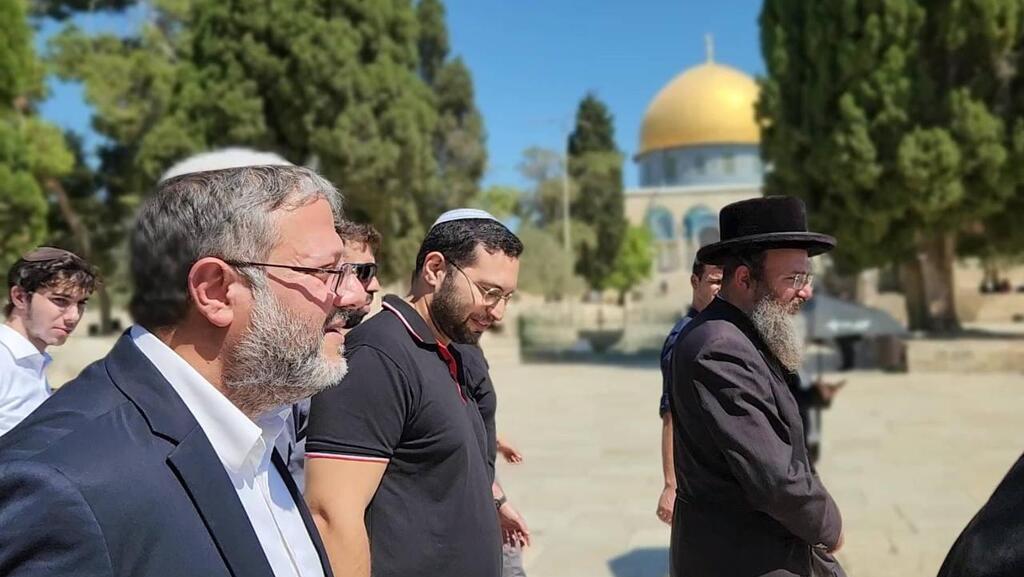Getting your Trinity Audio player ready...
It’s unfortunate that National Security Minister Itamar Ben-Gvir has become the face of the struggle for Jewish prayer rights on the Temple Mount. This only reinforces the stigma that ascending the Temple Mount is an activity reserved for extremists, messianic fantasists or provocative politicians.
In reality, this is a cause that every human rights advocate should support. It’s fundamentally absurd that the act of Jews praying and bowing at their holiest site is a matter that stirs political and media frenzy in Israel.
Israel’s Declaration of Independence promises freedom of religion for all its citizens. Religious freedom, including the right to worship, is a fundamental value in any free democracy, and it should only be restricted when it clearly conflicts with another important value.
In the case of the Temple Mount, the justification often cited is security. Defense Minister Yoav Gallant, for instance, argued that “undermining the status quo on the Temple Mount is dangerous, unnecessary and irresponsible.”
However, many similar assumptions have been challenged over the past year, and perhaps it’s time to question this one too. The claim that Jewish worshipers on the Temple Mount could "ignite the Middle East" is repeated time and again, but let’s be honest—the Middle East is already on fire.
History shows that terrorism always finds excuses to attack Jews, and when it lacks them, it invents lies and slanders. The familiar warning about sparking a "religious war" seems especially strange these days. After all, a religious war has been raging here for some time. It’s no coincidence that Hamas named its surprise attack on Israel "Operation Al-Aqsa Flood." How can anyone still doubt that this is a religious war?
In February, the Lebanese newspaper Al Akhbar reported that Hamas, as part of its proposal for a prisoner exchange deal, demanded a halt to Jewish visits to the Temple Mount—or, as they put it, "an end to the invasions and aggressions against the Al-Aqsa Mosque and a return to the conditions that existed before 2002."
According to a report from the same month on Channel 12's Ulpan Shishi, documents seized in Gaza revealed that one of the reasons Hamas launched its terror attack on October 7 was "the ongoing violations by senior Israeli officials against what is most sacred to Islam," as claimed by the Islamist terror organization, specifically citing Ben-Gvir's visits to the Temple Mount as a minister.
When a terrorist organization launches an attack to achieve certain goals, the logical response for a nation that values its existence is to signal that terrorism doesn’t pay. If, instead of securing the release of thousands of prisoners, scores of terrorists are killed or captured as a result of their actions, the terrorist group fails to achieve its objectives. If, instead of diminishing Jewish presence on the Temple Mount, Jewish visits to the site increase, it marks another failure for Hamas in reaching its goals.
The idea that Jewish prayer on the Temple Mount would provoke the international community is not a new argument. There’s an emerging alliance (surprising or not) between the center-left leadership and ultra-Orthodox leaders in opposition to this trend. The ultra-Orthodox opposition is rooted in two main arguments that shouldn’t concern any secular Zionist. The first is a halachic (Jewish legal) argument: leading rabbis have forbidden Jews from ascending the Temple Mount.
Just don't 'provoke the nations'
However, this view ignores the opinions of some rabbis who, following Rabbi Shlomo Goren, have permitted visits to the Temple Mount, provided certain areas identified as the site of the Temple are avoided.
The second argument is the fear of "provoking the nations." Yet, similar reasoning was used by ultra-Orthodox leaders who opposed Zionism and the establishment of the State of Israel. If we fear provoking the nations, why stop at opposing Jewish visits to the Temple Mount? Why not argue that prayer at the Western Wall, presence in the Old City or even the existence of the State of Israel is also provocative? Where does it end? Should we all return to exile to avoid offending anyone?
The term "status quo" is often invoked in this context as something sacred that must not be disturbed. But as with many other issues, such as religion-state relations or the relationship between the ultra-Orthodox community and the state, the status quo is not sacred. If it is morally flawed and unjust, it can be changed, and the decision should be in the hands of the authorities.
To be clear: consistent defense of human rights requires that, just as Jewish access to the Temple Mount should not be restricted, neither should Muslim access. A just fight for freedom of worship should not turn into a power struggle. The only people who should be barred from the site are those involved in terrorism or who pose a threat to public safety.
The aspiration to establish a synagogue on the Temple Mount is legitimate, as long as it does not come at the expense of Muslims who pray there. There’s nothing wrong with envisioning an interfaith complex where adherents of monotheistic religions can pray side by side, as the verse says, "For My house shall be called a house of prayer for all peoples."
It’s uncertain whether such a vision aligns with the beliefs of fundamentalists on either side, and achieving it would require everyone to abandon the notion that the other "defiles" the mountain by their mere presence.





